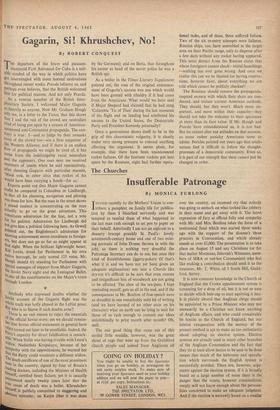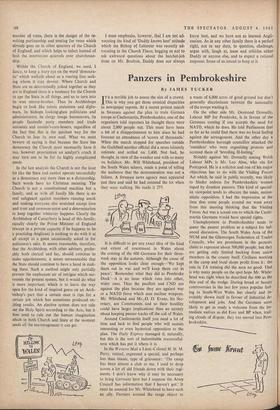The Churches
Insufferable Patronage
By MONICA FURLONG INVITED recently by the Mothers' Union to con- itribute a pamphlet on family life for publica- tion by them I blenched nervously and was tempted to remind them of what happened to the last man rash enough to set pen to paper on their behalf. Admittedly I am not an aspirant to a deanery (except possibly St. Paul's: lovely seventeenth-century house and one of two exist- ing portraits of John Donne thrown in with the job), so there is nothing very dreadful the Patronage Secretary can do to me, but once this kind of Establishment jiggery-pokery (if that's what it is and we have not yet been given an adequate explanation) sets into a Church like dry-rot it's difficult to be sure that even remote and insignificant bits of woodwork are not going to be affected. The claw of the sea-puss, I kept reminding myself, gets us all in the end, and if the consequences to Mr. Boulton of free speech were so dreadful in one remarkably mild bit of writing (and, we have learned of no other stain on his character) what on earth can be lying in wait for those of us rash enough to commit our ideas uninhibitedly to print month after month? Oh, well.
The one good thing that came out of this sordid little muddle, however, was the great shout of rage that went up from the Guildford church people and indeed from Anglicans all over the country, an incensed cry that nobody was going to embark on what looked like jobbery in their name and get away with it. The latest expression of fury at official folly and sympathy with Mr. and Mrs. Boulton takes the form of a testimonial fund which was started three weeks ago with the support of the diocese's three proctors in Convocation, and which already stands at over £1,000. The presentation is to take place on August 15 and any Christians (or for that matter Mormons, Jehovah's Witnesses, mem- bers of MRA or red-hot Communists) who feel like making a contribution should send it to the treasurer, Mr. T. White, of 1 South Hill, Guild- ford, Surrey.
It is now common knowledge in the Church of England that the Crown appointments system is screaming for a drop of oil, but it is not so easy to decide which hub-cap to start squirting it into. It is plainly absurd that Anglican clergy should be appointed by a Prime Minister who may not necessarily be a Christian nor know anything of Anglican affairs, and who could conceivably be hostile to the Church of England, but our intense exasperation with the secrecy of the present method is apt to make us too enthusiastic about adopting an elective system. Elective systems are already used in many other branches of the Anglican Communion and the fact that they do at least allow justice to be seen to be done means that much of the bitterness and specula- tion which surrounds the English system is successfully avoided. There are, however, argu- ments against the election system. If it is broadly based on a large number of votes there is the danger that the voters, however conscientious, simply will not know enough about the persona- lities concerned to make an adequate judgment. And if the election is narrowly based on a smaller number of votes, there is the danger of the re- volting partisanship and touting for votes which already goes on in other quarters of the Church of England, and which helps to infect instead of heal the internecine quarrels over churchman- ship.
Within the Church of England, we need, I fancy, to keep a wary eye on the word 'democra- tic' which walketh about as a roaring lion seek- ing whom it may devour. Where Church and State are so determinedly yoked together as they are in England there is a tendency for the Church to ape the State in all things, and so to turn into its wan mirror-brother. Thus its Archbishops begin to look like mimic statesmen and diplo- mats, its bishops looking-glass politicians and administrators, its clergy image bureaucrats, its people facsimile party members and trade unionists and could n't-care-lessers, regardless of the fact that this is the quickest way for the Church to lose its own soul. What we must beware of saying is that because the State has democracy the Church must necessarily have it too, however procrustean an analyst's couch it may turn out to be for its highly complicated needs.
In the last analysis the Church is not the least bit like the State and cannot operate successfully as a democracy any more than as a dictatorship. Such words have no Christian meaning. The Church is not a constitutional machine but a family, and as with all family life there is no real safeguard against members, running amok and making everyone else wretched except love and trust and common-sense and a determination to keep together whatever happens. Clearly the Archbishop of Canterbury is head of this family; equally clearly the Prime Minister of England (except in a private capacity if he happens to be a practising Anglican) is nothing to do with it at all except as a guest occasionally asked in for politeness's sake. It seems reasonable, therefore, that the Archbishop, with other advisers, prefer- ably both clerical and lay, should continue to make appointments; it seems unreasonable that the State should continue to have a hand in mak- ing them. Such a method might only partially prevent the unpleasant air of intrigue which sur- rounds the present system, but it would do what is more important, which is to leave the way open for the kind of inspired guess on an Arch- bishop's part that a certain man is ripe for a certain job which has sometimes produced ex- citing results. An elective system does not rule JUt the Holy Spirit according to the Acts, but it foes tend to rule out the human imagination which in both Church and State at the moment 'weds all the encouragement it can get. I must emphasise, however, that I am not ad- vocating the kind of 'Daddy knows best' attitude which the Bishop of Leicester was recently ad- vocating in the Church Times, begging us not to ask awkward questions about the hatchet-job done on Mr. Boulton. Daddy does not always know best, and we have not so learned Angli- canism. As in any other family there is a perfect right, not to say duty, to question, challenge, argue with, laugh at, tease and criticise either Daddy or anyone else, and to expect a rational response. Some of us intend to keep at it.



































 Previous page
Previous page